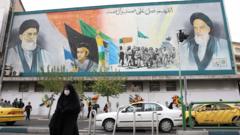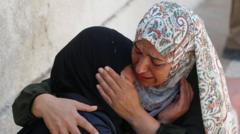As the conflict between Iran and Israel deepens, Iran's supreme leader, Ayatollah Khamenei, faces the challenging task of determining a suitable response. With options ranging from missile retaliation to avoiding escalation entirely, the stakes are higher than ever. Meanwhile, international pressure, especially from the U.S., complicates Iran's decision-making process.
Iran's Dilemma: Escalation or Appeasement in the Face of Israeli Threats

Iran's Dilemma: Escalation or Appeasement in the Face of Israeli Threats
In the wake of escalating tensions, Iran's leadership confronts a critical juncture, weighing its response to Israel's military actions against the backdrop of regional stability and internal pressures.
Empty line 4
The ongoing conflict between Iran and Israel has intensified, with Iran’s leadership at a crossroads regarding how to respond to Israeli military actions. Recent Israeli airstrikes have brought to the forefront the delicate balance of power in the Middle East, as Iran's supreme leader, Ayatollah Ali Khamenei, evaluates potential courses of action amid extreme pressure from his advisers.
On one side, Iran could retaliate forcefully with ballistic missiles, a tactic that Israel has warned will provoke further retaliation in what is becoming a dangerous cycle of aggression. On the other hand, heeding the advice to restrain from retaliating may lead to perceptions of weakness in the eyes of both allies and adversaries. The dilemma revolves around navigating these two extremes while ensuring the survival of Iran's Islamic regime.
In recent communications, Iranian officials have issued statements reflecting a stance of defiance, echoing sentiments of self-defense following attacks from Israel. Foreign Minister Abbas Araghchi conveyed stern warnings about any assaults on Iranian territory, while the Foreign Ministry emphasized Iran's "right to self-defense" as outlined in the UN Charter. However, the gravity of the situation raises the question of whether Tehran's bold proclamations will translate into action or if they might reconsider their stance to avoid escalation.
As tensions mount, British Prime Minister Sir Keir Starmer has aligned with the U.S. narrative, acknowledging Israel's right to defend itself but urging caution from all parties to prevent further destabilization. This call for restraint reflects broader international concerns about the potential for a wider conflict engulfing the region.
The strategic calculations at play are further complicated by the history of escalations leading to the current predicament. Israel interprets Iran’s avoidance of direct confrontation as an opportunity to intensify military efforts, undermining Iran's alliance with its proxies like Hezbollah and the Houthis. Notably, the recent Israeli offensive has resulted in significant casualties and displacements in Lebanon, compelling Hezbollah to reassess its position.
With the stalemate prompting Iran to escalate its military response, drone and missile strikes have become a pivotal element of its strategy. Although these provocations aim to remind adversaries of Iran’s capabilities, the potential for miscalculation looms large, risking a full-scale war that neither side may desire.
In an effort to manage this volatile dynamic, President Biden's administration has been involved in diplomatic efforts to prevent further escalation, advising Israel against targeting critical Iranian assets. The upcoming U.S. elections also play a role in the calculus of both nations, as shifts in leadership could significantly impact U.S. foreign policy and military posture in the region.
In this critical phase of the conflict, the world watches closely as Tehran weighs its options. While the prospect of developing a nuclear deterrent remains an ongoing concern, the immediate priority for Iran may involve resetting the stage for negotiations, particularly in light of recent overtures for renewed nuclear talks. The outcome of this precarious situation holds implications far beyond the Middle East, as the global community grapples with the potential fallout from an unchecked escalation of hostilities.
The ongoing conflict between Iran and Israel has intensified, with Iran’s leadership at a crossroads regarding how to respond to Israeli military actions. Recent Israeli airstrikes have brought to the forefront the delicate balance of power in the Middle East, as Iran's supreme leader, Ayatollah Ali Khamenei, evaluates potential courses of action amid extreme pressure from his advisers.
On one side, Iran could retaliate forcefully with ballistic missiles, a tactic that Israel has warned will provoke further retaliation in what is becoming a dangerous cycle of aggression. On the other hand, heeding the advice to restrain from retaliating may lead to perceptions of weakness in the eyes of both allies and adversaries. The dilemma revolves around navigating these two extremes while ensuring the survival of Iran's Islamic regime.
In recent communications, Iranian officials have issued statements reflecting a stance of defiance, echoing sentiments of self-defense following attacks from Israel. Foreign Minister Abbas Araghchi conveyed stern warnings about any assaults on Iranian territory, while the Foreign Ministry emphasized Iran's "right to self-defense" as outlined in the UN Charter. However, the gravity of the situation raises the question of whether Tehran's bold proclamations will translate into action or if they might reconsider their stance to avoid escalation.
As tensions mount, British Prime Minister Sir Keir Starmer has aligned with the U.S. narrative, acknowledging Israel's right to defend itself but urging caution from all parties to prevent further destabilization. This call for restraint reflects broader international concerns about the potential for a wider conflict engulfing the region.
The strategic calculations at play are further complicated by the history of escalations leading to the current predicament. Israel interprets Iran’s avoidance of direct confrontation as an opportunity to intensify military efforts, undermining Iran's alliance with its proxies like Hezbollah and the Houthis. Notably, the recent Israeli offensive has resulted in significant casualties and displacements in Lebanon, compelling Hezbollah to reassess its position.
With the stalemate prompting Iran to escalate its military response, drone and missile strikes have become a pivotal element of its strategy. Although these provocations aim to remind adversaries of Iran’s capabilities, the potential for miscalculation looms large, risking a full-scale war that neither side may desire.
In an effort to manage this volatile dynamic, President Biden's administration has been involved in diplomatic efforts to prevent further escalation, advising Israel against targeting critical Iranian assets. The upcoming U.S. elections also play a role in the calculus of both nations, as shifts in leadership could significantly impact U.S. foreign policy and military posture in the region.
In this critical phase of the conflict, the world watches closely as Tehran weighs its options. While the prospect of developing a nuclear deterrent remains an ongoing concern, the immediate priority for Iran may involve resetting the stage for negotiations, particularly in light of recent overtures for renewed nuclear talks. The outcome of this precarious situation holds implications far beyond the Middle East, as the global community grapples with the potential fallout from an unchecked escalation of hostilities.




















